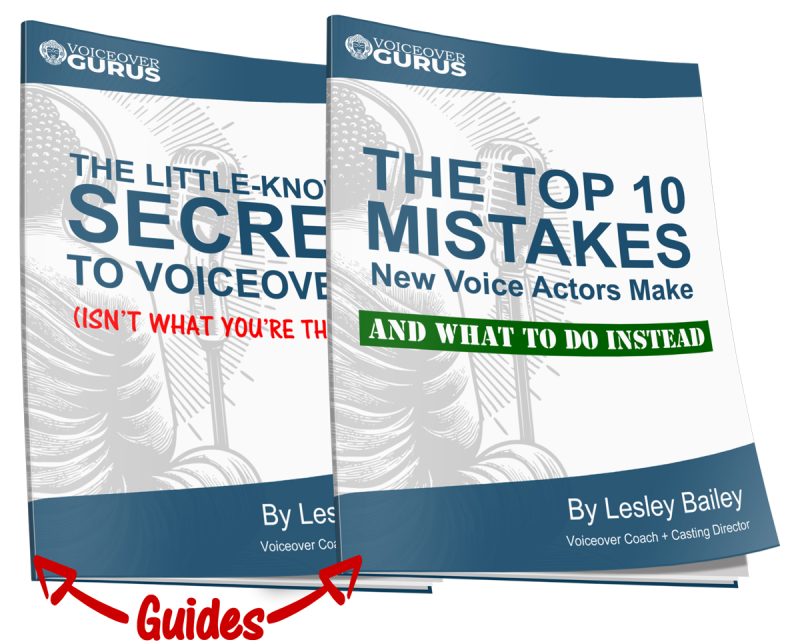It’s been a long time since I’ve written on the subject of voiceover technique. If you feel like skipping this moment while I muse on how I came to write this particular set of voiceover tips, you can go to the next paragraph and you’re forgiven. What has happened to me over the years of voiceover coaching is that I have learned so much more about coaching, about how to TEACH. In the beginning of my career it was all about sharing how much knowledge I had about the various ways to book voiceover jobs, about how to use your inflection, your keywords, your volume, your pacing, etc. What I have added to my resume since then is the even more important ability to teach. This concept comes through a bit less powerfully in a blog article to a general audience, but when coaching an individual voice actor it is magic. We all learn differently because we all think differently. Some of us need a push to let the emotions out, some of us need our right brain to be taught to because our left has gone on vacation…and now I see that this is truly what teaching is about. It is as much about teaching to the INDIVIDUAL PERSON as it is about teaching the material. So here are the interesting teaching moments I have experienced through many individuals who have given me the opportunity to teach them and learn from them in less traditional ways.
I have a student, let’s call him Joe, who struggled with his pacing/pausing. This is one of the many ways we can communicate (or fail to) authenticity in a performance. When we’re excited we talk a little faster, when we are being serious or sincere we go a little slower, etc. This is what we do in real life and therefore it becomes critical that we use the appropriate pace required of the emotional subtext of the writing. Pausing is a part of this as well. We really only pause in real life if it is grammatically necessary (to separate points in communication). We also pause for dramatic effect, but not that often in everyday conversation. But oh do you voice actors loooove to pause! It’s fun, indulgent, and dramatic! It helps you breathe through longer sentences! But it’s not what you do in real life, so it is going to sound theatrical. Joe was reading a sentence – “Sometimes you just want a great latte.” We decided that the main keyword was latte, but great was an important leading word too. Joe read the sentence and paused after the word Sometimes. Another time he paused after the word Want. It was unnecessary, unnatural, and too dramatic for the subject. I told Joe to think about his keyword “latte” as a restaurant that he was meeting a friend at. I asked him if he would normally make any stops along the way when driving to the restaurant. He said “probably not.” Then guess what Joe? Don’t make any unnecessary stops on the way to “latte!” Pausing: do less of it 🙂
I had another student, Mary, who taught me a great way to think about the process of experimenting and seeing what you can do with a voiceover script and how you can express yourself properly but also creatively through it. Mary likened it to a child playing in the sandbox. There’s no way to experience that type of play and discovery without making a mess. And that’s to be expected. Recognize that when you are training to be a voice actor, and even if you are already auditioning, that self-censorship destroys the magic. So many people try to read “perfectly.” All this does is create tight boundaries around the delivery that leave it flat, colorless, and often without a smile. Let go, have fun, make a mess, and see how much brighter you sound! I add to Mary’s analogy that it is like a woman trying to find one tiny thing in her huge purse. She can’t find it because it’s lost in the cavernous folds of the fabric, shuffling around with a myriad of other objects. Sometimes you have to turn the purse upside down and dump EVERYTHING out on the table to find what you were looking for. Back to making a mess. Shake out your shoulders, smile a bit more, take a risk. Let it ALL out. (You can always put back a few things that you didn’t need on take 2.)
My new favorite is from Matthew. He asked me if it was “ok” to listen to music while recording his voiceover auditions. OK? It’s a fantastic idea Matthew, and I’m telling everyone! So thank you! The word “ok” also reminded me that there are no HARD rules in this creative world, only “ish” concepts. Basically, whatever works for you is not only OK, it’s fantastic! As long as the outcome is authentic. That’s really the crux of it – there’s nothing natural about saying someone ELSE’s words, so pull whatever tricks you want. My student Wayne says he grew up in a household full of Scandinavian intellectuals and there was absolutely no emoting. Wayne could certainly benefit from some music. Don’t the tears come hardest in the sad scene in the movie when the sad song starts in?
Lastly I want to cover a session I had where my student Liv was just holing back emotionally as well…more so out of inhibitions. Society tells us to be one thing and then the best voice acting technique asks us to defy that and be everything sometimes. First I just told Liv it was okay to be expressive, that this was not about sounding perfect in any way, in fact that is what will fail in a performance. Real life is not perfect so neither is communication. Get wild, have fun, color outside the lines, stop taking it so seriously – because then you sound SERIOUS! UPTIGHT! Nooo! So Liv, you have permission to do this on your terms. That was the key for her, just knowing she had permission. Hmm. Connected to that idea would be censorship. She stopped and started a lot during a script. I reminded her that was her censor-self getting in the way and judging everything and that is a big no for any artistic expression. BE first, censor later….but I bet you won’t have to at that point – because you gave yourself permission to shine.


 Hi! I’m Lesley Bailey. I’m an award-winning Casting Director, Voiceover Coach, Demo Producer, and Consultant with over 30 years “in the trenches”. I love helping voice actors bring scripts to life with authenticity and confidence.
Hi! I’m Lesley Bailey. I’m an award-winning Casting Director, Voiceover Coach, Demo Producer, and Consultant with over 30 years “in the trenches”. I love helping voice actors bring scripts to life with authenticity and confidence.